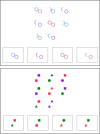Can musical ability be tested online?
- PMID: 34382202
- PMCID: PMC8357346
- DOI: 10.3758/s13428-021-01641-2
Can musical ability be tested online?
Erratum in
-
Author Correction: Can musical ability be tested online?Behav Res Methods. 2024 Jan;56(1):510. doi: 10.3758/s13428-023-02280-5. Behav Res Methods. 2024. PMID: 37966663 Free PMC article. No abstract available.
Abstract
We sought to determine whether an objective test of musical ability could be successfully administered online. A sample of 754 participants was tested with an online version of the Musical Ear Test (MET), which had Melody and Rhythm subtests. Both subtests had 52 trials, each of which required participants to determine whether standard and comparison auditory sequences were identical. The testing session also included the Goldsmiths Musical Sophistication Index (Gold-MSI), a test of general cognitive ability, and self-report questionnaires that measured basic demographics (age, education, gender), mind-wandering, and personality. Approximately 20% of the participants were excluded for incomplete responding or failing to finish the testing session. For the final sample (N = 608), findings were similar to those from in-person testing in many respects: (1) the internal reliability of the MET was maintained, (2) construct validity was confirmed by strong associations with Gold-MSI scores, (3) correlations with other measures (e.g., openness to experience, cognitive ability, mind-wandering) were as predicted, (4) mean levels of performance were similar for individuals with no music training, and (5) musical sophistication was a better predictor of performance on the Melody than on the Rhythm subtest. In sum, online administration of the MET proved to be a reliable and valid way to measure musical ability.
Keywords: Ability; Expertise; Melody; Music; Rhythm; Training.
© 2021. The Psychonomic Society, Inc.
Figures


References
-
- Asztalos K, Csapó B. Online assessment of musical abilities in Hungarian primary schools—results of first, third and fifth grade students. Bulletin of the International Kodály Society. 2014;39(1):3–14.
MeSH terms
LinkOut - more resources
Full Text Sources
Miscellaneous

